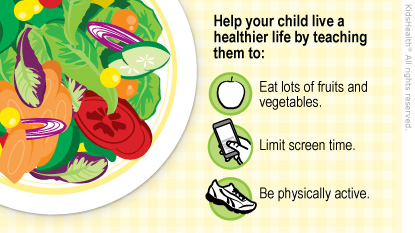Metabolic syndrome is a group of medical problems that may put kids and teens at risk for diabetes and heart disease as they get older. Kids and teens may have metabolic syndrome if they have at least 3 of the following:
Many of these conditions are reversible, usually by weight loss or, in kids who are still growing, by slowing the rate of weight gain. By making healthy diet choices, getting plenty of exercise, and never smoking, your child can lower their risk of metabolic syndrome and the medical problems it can cause.


Make healthy choices a regular part of your family's routine. Here are some tips:

Your child:

How do health care providers diagnose metabolic syndrome? They check:
If enough of these measurements and tests are abnormal, a child has metabolic syndrome.
What causes metabolic syndrome? Being overweight is the main reason that people get metabolic syndrome. Excess weight causes insulin resistance. This is when the chemical insulin can't do its usual job of helping glucose (fuel for the body) enter the body's cells. This causes high insulin and glucose levels in the body, which can lead to diabetes, high blood pressure, and heart disease.
What other treatments might kids and teens with metabolic syndrome need? If changes in diet and exercise don't help, kids may need other treatments like medicines for high blood pressure or high blood sugars. Health care providers might recommend weight loss surgery for some teens who are having trouble losing weight with lifestyle changes.
Why is it important to treat metabolic syndrome? Treating metabolic syndrome is important for your child's health today and in the future. If metabolic syndrome is not treated, kids can develop diabetes and, as adults, could be at risk for heart attack or stroke.
Now is the perfect time to help your child learn healthy eating and physical activity habits that can last a lifetime.